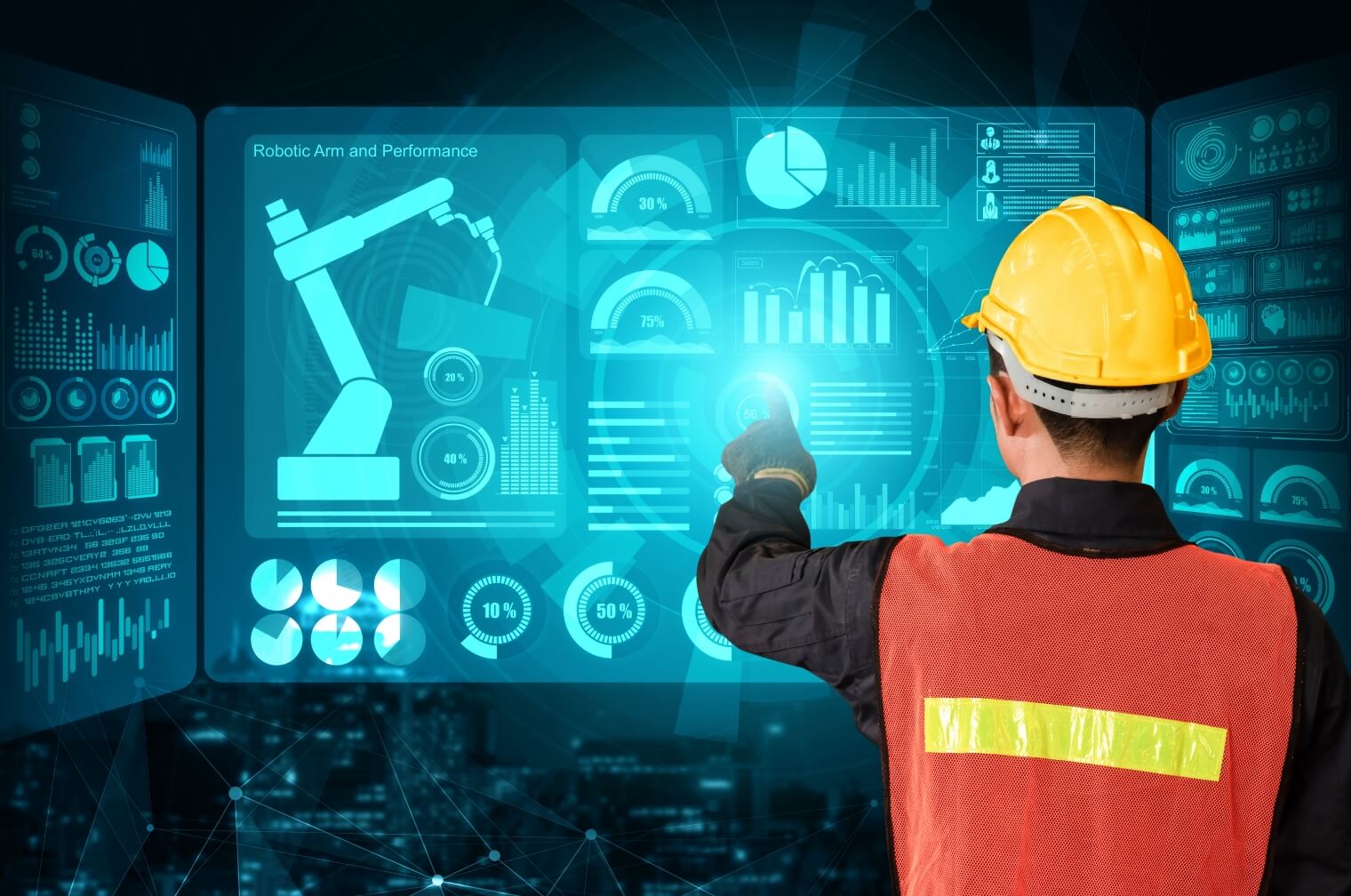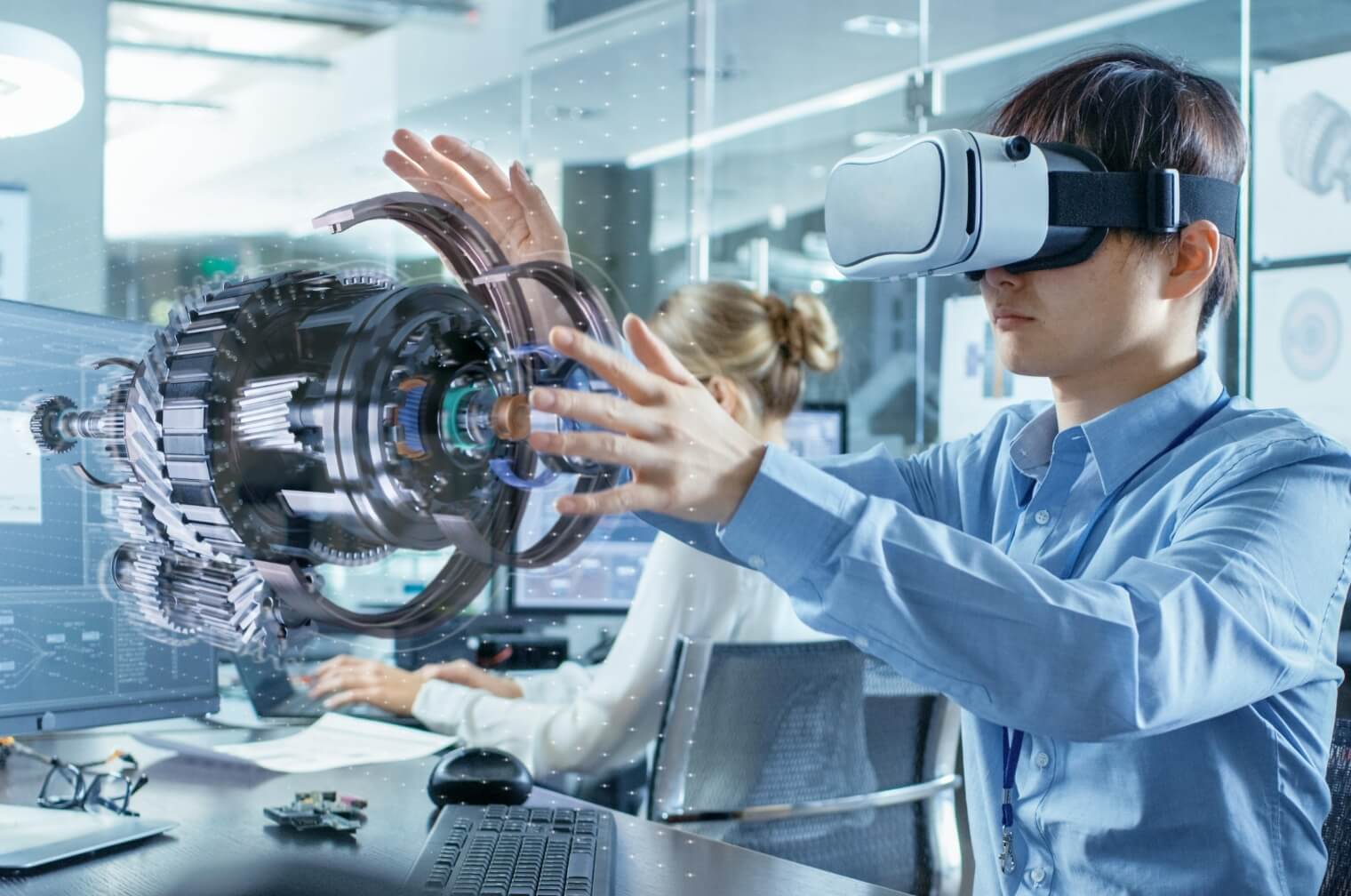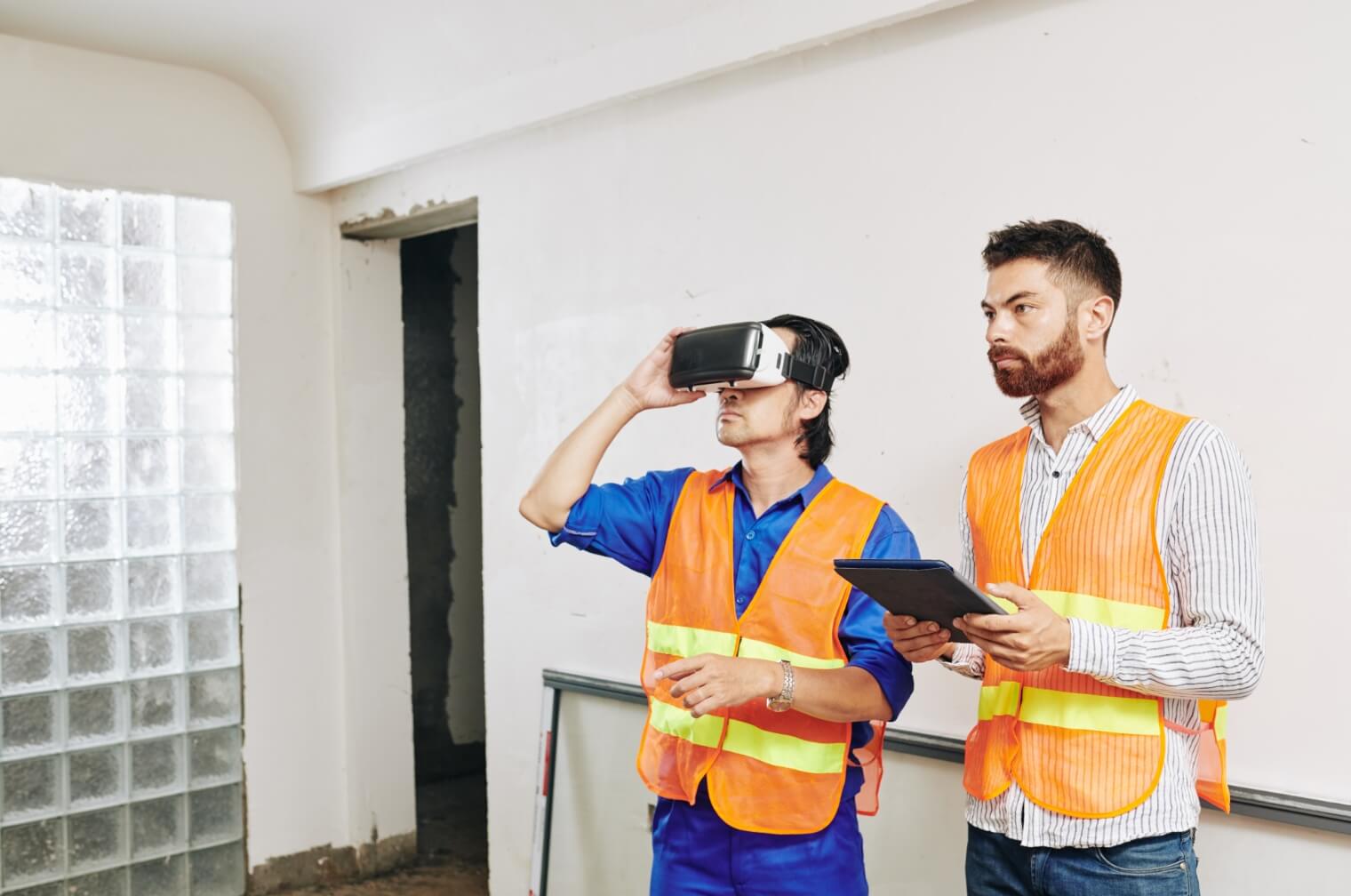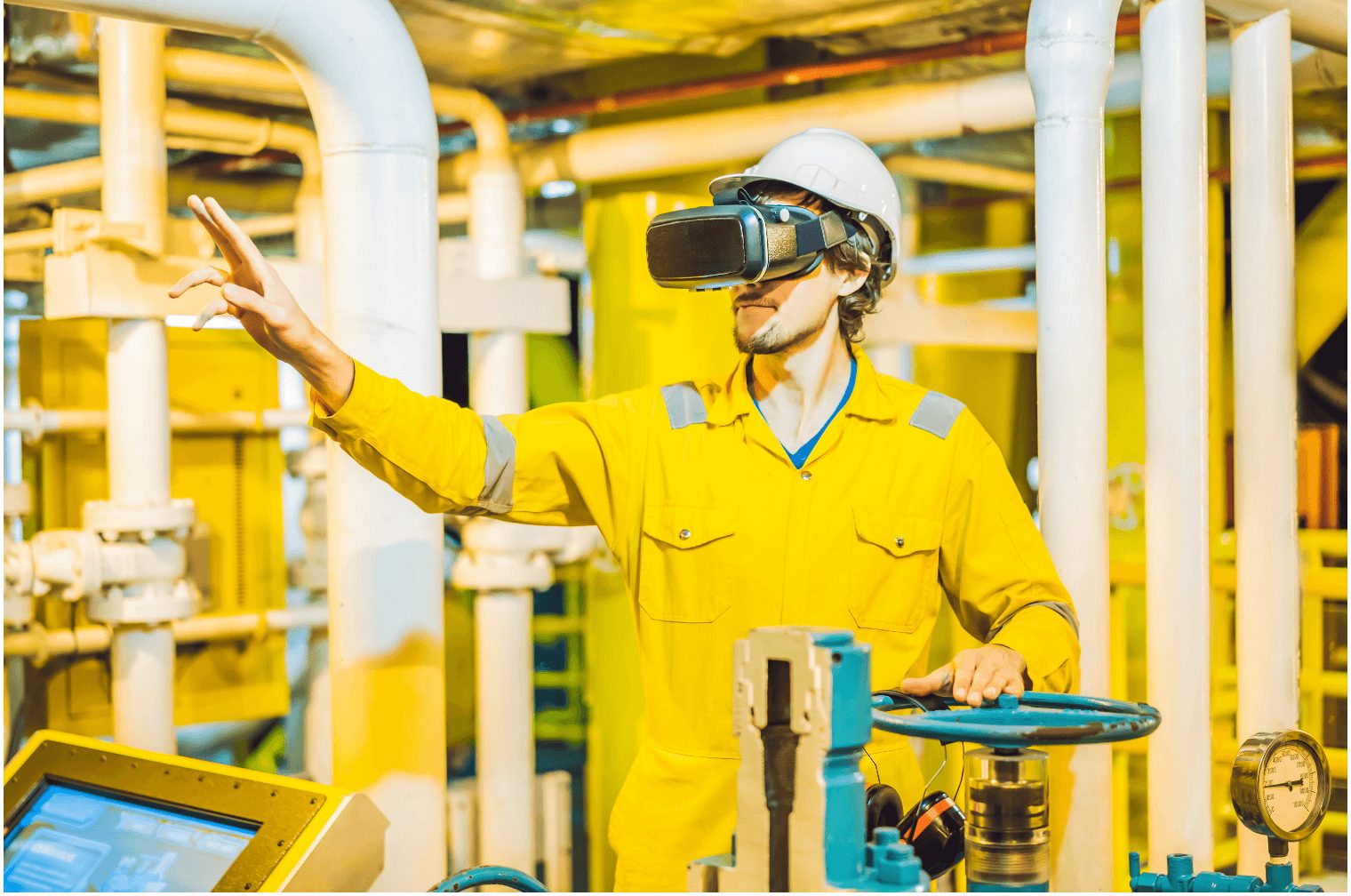Machine Learning and AI for revolution of Tech Companies are changing and streamlining businesses.
The concept of metaverse is getting acknowledged as the digital landscape is evolving daily. As the metaverse spreads its wings in various industries, Oil and Gas also experience the effect of Immersive Technology.
The metaverse is a collective virtual shared space that intervenes in the lines between physical and virtual worlds.
Traditionally, the oil and gas app development industry has been characterized by its high-risk environments, complex operations, and substantial reliance on data and communication.
Oil and gas metaverse solutions display an intriguing chance for innovation and transformation.
Understand the metaverse
The metaverse is a combination of various technologies, including Virtual Reality (VR), Augmented Reality (AR), Mixed Reality (MR), Blockchain, and more.
VR creates immersive, computer-generated, virtual environments, while AR overlays digital information onto the real world.
MR combines the features of both AR and VR, enabling the interaction of digital and physical objects. It is particularly useful for visualizing and inspecting products in real-time.
Blockchain technology ensures secure and transparent transactions within the Metaverse Development Company.
How the metaverse is changing the oil and gas industry
The oil and gas industry has been a crucial part of the global economy for a long time, providing the energy necessary for different sectors and driving economic growth.
However, in recent years, the industry has encountered several challenges, such as fluctuating oil prices and growing environmental concerns.
The oil and gas metaverse solution has come out as a transformative power, bringing new possibilities and reshaping the operations of the oil and gas industry.
With advancements in technology, ViitorCloud has created a world of opportunity by keeping the metaverse in its hands
Applications of the metaverse oil and gas development
With its immersive and interactive nature, the metaverse offers numerous applications that can greatly benefit the oil and gas metaverse development.
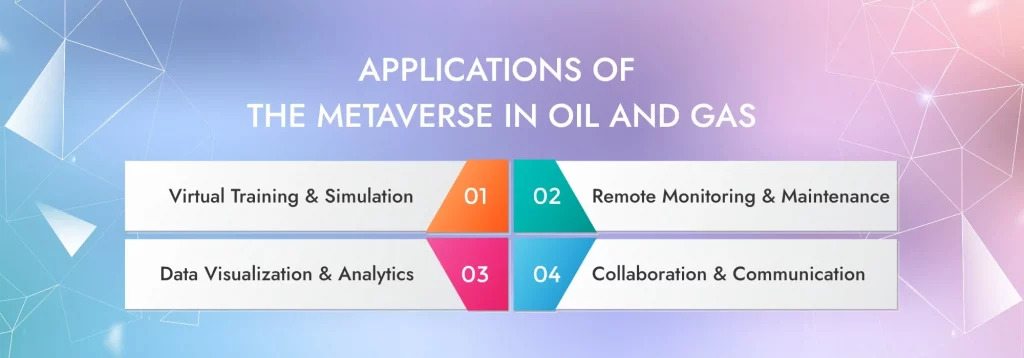
- Virtual Training and Simulation:
This Oil and Gas Metaverse industry involves a high-risk environment, and that’s why ensuring the safety and competency of employees is very important.
With VR, employees can be trained in emergency response protocols and equipment handling by creating artificial scenarios and without exposure to the risks involved.
This improves safety and also saves costs associated with traditional training methods.
- Remote Monitoring and Maintenance:
AR can be utilized for remote monitoring and maintenance in the Oil and gas metaverse solution.
AR applications provide real-time insights regarding the conditions of the assets, which helps in determining proactive maintenance and minimizing downtime. This way the need for on-site visits, time, and resources are saved in the oil and gas app development.
Technicians can access step-by-step instructions and visual aids through AR glasses or mobile devices, enabling them to perform complex tasks with greater efficiency.
- Data Visualization and Analytics:
With the help of immersive technologies, such as virtual reality and augmented reality, data can be visualized more intuitively and interactively.
By creating virtual representations of oil fields, reservoirs, and pipelines, geologists and engineers can gain a deeper understanding of the data they are working with.
This allows for better analysis and interpretation, leading to more informed decision-making.
- Collaboration and Communication:
Virtual meeting spaces and collaboration tools within the metaverse allow global teams to connect and work together in a more immersive and engaging manner to become effective and engaging.
Furthermore, immersive environments allow for brainstorming sessions that go beyond traditional video conferencing, allowing for more innovative and collaborative problem-solving.
Challenges and considerations in metaverse oil and gas
Incorporating the metaverse into the oil and gas industry has its own share of challenges and considerations. Some of these challenges are:
Challenges in metaverse oil and gas
- Data Security and Privacy: The oil and gas industry deals with sensitive and critical data. Ensuring data security and privacy within the metaverse is a paramount concern.
- High Initial Costs: Creating and maintaining a presence in the oil and gas metaverse solution can be costly, including the development of virtual oil rigs and operational environments.
- User Training and Adoption: Training the existing workforce to navigate and operate within the metaverse includes ensuring that employees are comfortable with new virtual tools and environments.
- Connectivity and Bandwidth: The oil and gas industry often operates in remote areas, so ensuring reliable and high-speed internet connections can be problematic.
Considerations in metaverse oil and gas
- Remote Operations: The oil and gas metaverse solution can enable remote monitoring and control of oil and gas operations. Companies can manage rigs, pipelines, and facilities from anywhere, reducing the need for physical presence and improving safety.
- Training and Simulation: Oil and gas metaverse solutions can help in practicing emergency response, equipment maintenance, and troubleshooting in a virtual environment, enhancing their skills without physical risk.
- Collaboration and Communication: Virtual meeting spaces and collaborative tools in the metaverse can facilitate better communication between geographically dispersed teams, allowing for quicker decision-making and problem-solving.
- Data Visualization: The metaverse can provide advanced data visualization tools, allowing professionals to interact with complex data sets in immersive 3D environments. This aids in data analysis and decision-making.
Case studies of oil and gas metaverse solution
The oil and gas industry is embracing technology, including the metaverse, to improve operations, safety, and efficiency.
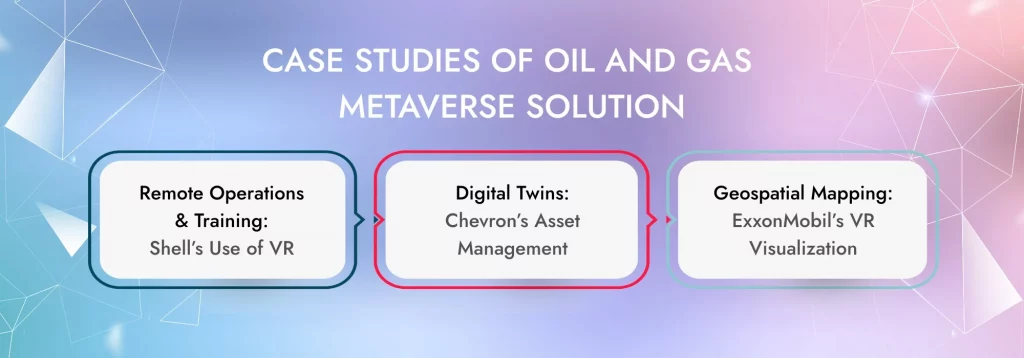
Remote operations and training: shell’s use of VR
Shell has implemented virtual reality (VR) and augmented reality (AR) for remote operations and training.
They use immersive technologies to provide realistic training scenarios and allow experts to guide field operators remotely.
Digital twins: chevron’s asset management
Chevron employs digital twin technology, a concept closely related to the metaverse, to create a virtual replica of physical assets.
This enables real-time monitoring, predictive maintenance, and efficient resource management in cooperation with oil and gas metaverse solutions.
Geospatial mapping: exxonmobil’s VR visualization
ExxonMobil utilizes VR for geospatial mapping and reservoir visualization.
Engineers and geologists can immerse themselves in data-rich 3D models, enabling better decision-making regarding exploration, drilling, and reservoir management.
Conclusion
Metaverse technology is arising with the potential to revolutionize Metaverse Oil and gas development in many ways.
Oil and gas metaverse solutions have the potential to improve efficiency, safety, and sustainability. It can also help the industry to attract and retain new talent.
With the Exciting Possibilities of metaverse Transform Your Industry and stay ahead of the game!
Frequently asked questions
Oil and Gas Metaverse can reduce costs by enabling remote operations, training, and collaboration, as well as by optimizing operations through data visualization and analytics.
Metaverse Oil and gas development can improve efficiency by streamlining workflows, automating tasks, and reducing downtime.
Metaverse Oil and Gas offers many benefits, including improved efficiency, reduced costs, increased safety, and enhanced sustainability.
Future trends for the metaverse in oil and gas include the development of more immersive and interactive applications, the integration of artificial intelligence and machine learning, and the increasing use of metaverse for remote operations and training.




